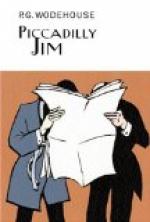Meanwhile, he had still to find a place where he could
read his
Sunday paper.
He stood for a while in thought. Then his brow cleared, and he began to mount the stairs. Reaching the top floor, he walked along the passage and knocked on a door at the end of it. From behind this door, as from behind those below, sounds proceeded, but this time they did not seem to discourage Mr. Pett. It was the tapping of a typewriter that he heard, and he listened to it with an air of benevolent approval. He loved to hear the sound of a typewriter: it made home so like the office.
“Come in,” called a girl’s voice.
The room in which Mr. Pett found himself was small but cosy, and its cosiness—oddly, considering the sex of its owner—had that peculiar quality which belongs as a rule to the dens of men. A large bookcase almost covered one side of it, its reds and blues and browns smiling cheerfully at whoever entered. The walls were hung with prints, judiciously chosen and arranged. Through a window to the left, healthfully open at the bottom, the sun streamed in, bringing with it the pleasantly subdued whirring of automobiles out on the Drive. At a desk at right angles to this window, her vivid red-gold hair rippling in the breeze from the river, sat the girl who had been working at the typewriter. She turned as Mr. Pett entered, and smiled over her shoulder.
Ann Chester, Mr. Pett’s niece, looked her best when she smiled. Although her hair was the most obviously striking feature of her appearance, her mouth was really the most individual thing about her. It was a mouth that suggested adventurous possibilities. In repose, it had a look of having just finished saying something humorous, a kind of demure appreciation of itself. When it smiled, a row of white teeth flashed out: or, if the lips did not part, a dimple appeared on the right cheek, giving the whole face an air of mischievous geniality. It was an enterprising, swashbuckling sort of mouth, the mouth of one who would lead forlorn hopes with a jest or plot whimsically lawless conspiracies against convention. In its corners and in the firm line of the chin beneath it there lurked, too, more than a hint of imperiousness. A physiognomist would have gathered, correctly, that Ann Chester liked having her own way and was accustomed to get it.
“Hello, uncle Peter,” she said. “What’s the trouble?”
“Am I interrupting you, Ann?”
“Not a bit. I’m only copying out a story for aunt Nesta. I promised her I would. Would you like to hear some of it?”
Mr. Pett said he would not.
“You’re missing a good thing,” said Ann, turning the pages. “I’m all worked up over it. It’s called ‘At Dead of Night,’ and it’s full of crime and everything. You would never think aunt Nesta had such a feverish imagination. There are detectives and kidnappers in it and all sorts of luxuries. I suppose it’s the effect of reading it, but you look to me as if you were trailing something. You’ve got a sort of purposeful air.”




